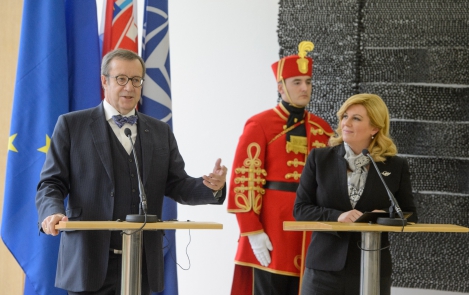-
Reset
+


President Ilves in Zagreb: Estonia and Croatia share the understanding of the problems affecting border states and Europe in general
21.03.2016
"Estonia and Croatia are border countries that share the understanding of the problems affecting border states and Europe in general; we know that only unity will help Europe move forward," said President Toomas Hendrik Ilves, who arrived in Zagreb for an official visit with his spouse, at the meeting with the Head of State of Croatia, Kolinda Grabar- Kitarović. "We know it is important to maintain the success story of the European Union and the solidarity of NATO, in which we have both shared."
In Europe today we are experiencing the most complicated security situation since World War II, as we face complicated and real, not theoretical, foreign and internal challenges, stated President Ilves; according to the President, such a situation is highly sensitive and particularly so for small countries like Estonia and Croatia.
"The key words for coping with crises are coherence and solidarity, as well as mutual understanding of each other's problems from east to west and north to south," emphasised the Estonian Head of State.
President Ilves welcomed the agreement between the European Union and Turkey, describing it as an important step in the right direction.
"I am happy with the decisiveness of the EU; we have a clear plan and fixed deadlines. If we do everything that is planned, it will reduce the pressure on our external borders and, most importantly, it will reduce the possibilities of the refugees becoming prey for networks of human traffickers," said the Estonian Head of State.
According to the President, Estonia will support Croatia in becoming part of the Schengen visa space, which is a sign that the European Union has remained true to its current standards.
The Estonian Head of State admitted that Russia's aggression in Ukraine and annexation of Crimea will influence European security space, and several threats that result in instability are mainly connected with the southern wing.
"In the light of this, the NATO Summit in Warsaw should put focus on strengthening both the southern and eastern wings of the alliance," said the Estonian Head of State.
Estonia will support NATO's open door policy; in turn, the European Union should not be closed to states that share European values and will be ready to join the community in the future, remarked President Ilves.
Both heads of state encouraged Estonian and Croatian enterprises to engage in more extensive co-operation in the sphere of economy and trade; the possibilities for such co-operation were confirmed by the representative business delegation that accompanied the Estonian president.
The heads of state also spoke about the Adriatic-Baltic-Black Sea co-operation initiative, which was introduced by the President of Croatia, as a tool to enhance regional partnership. President Ilves invited Croatia to join the NATO Cyber Defence Centre of Excellence in Tallinn.
Tomorrow, President Ilves will meet the Prime Minister of Croatia, Tihomir Orešković, and the Speaker of the Parliament, Academician Željko Reiner, and he will deliver a public lecture entitled "Europe at a Crossroads" at Zagreb University. The day after tomorrow he will also pay a visit to the IT and robotics centres of Rijeka University and the small town of Opatija.
Ieva Ilves, who will be accompanied by Jakov Kitarović, the spouse of the Croatian Head of State, who has a background in IT and cyber security, will visit Reversing Labs in Zagreb, a company that is focused on the development of cyber defence software and has an international market.
The official delegation that accompanies the Head of State includes the Minister of Foreign Affairs, Marina Kaljurand; Minister of the Interior, Hanno Pevkur; Minister of Entrepreneurship, Liisa Oviir; and Commander of the Defence Forces, Riho Terras. The official delegation also includes Deputy Secretary General for Political Affairs, Kyllike Sillaste-Elling; Deputy Secretary General for Economic Development of the Ministry of Economic Affairs and Communications, Viljar Lubi; Data Security Professor of the Institute of Computer Sciences of University of Tartu, Professor Dominique Unruh; and a member of the Riigikogu, Peeter Ernits.
Office of the President
Public Relations Department




